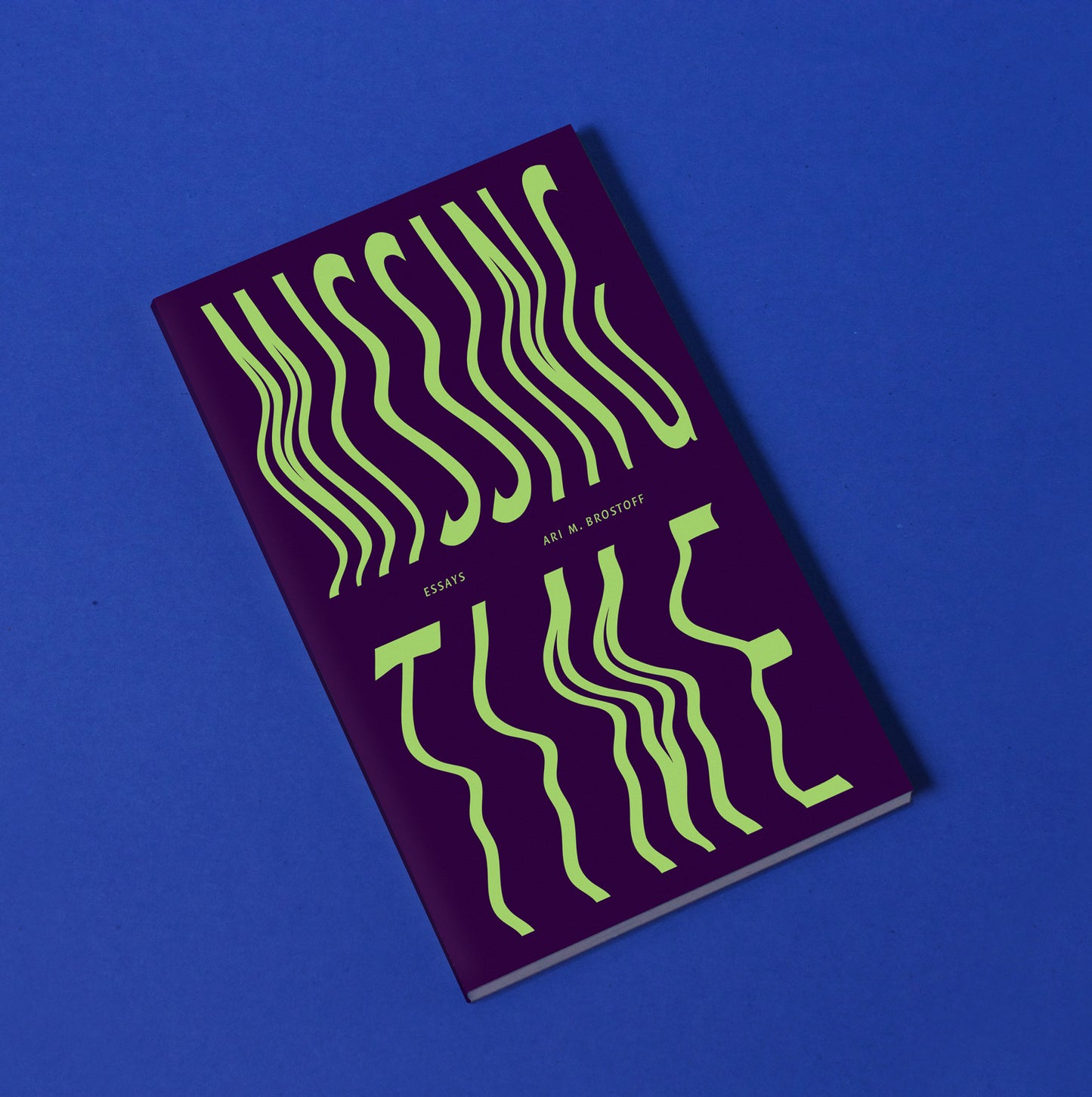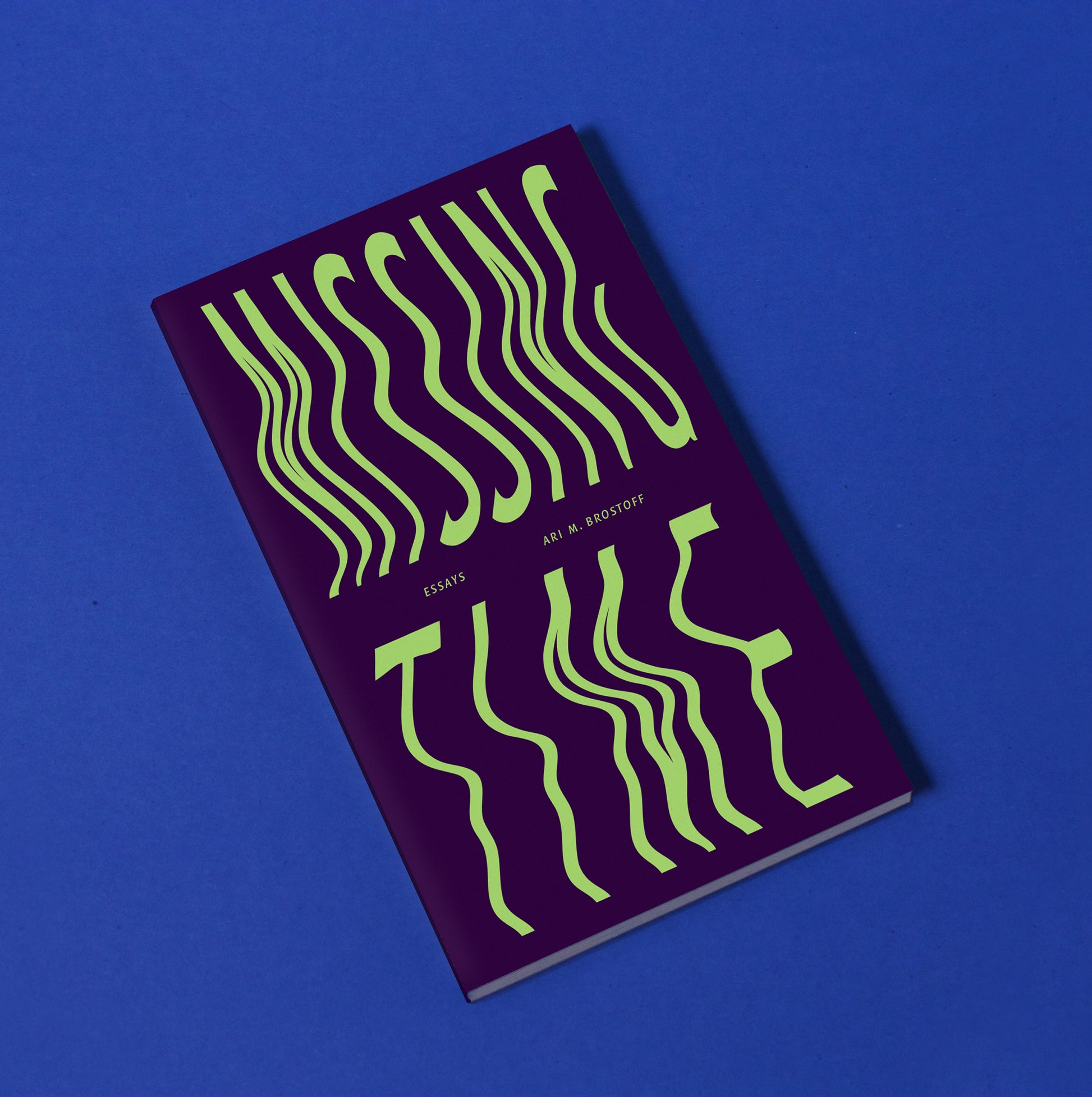Missing Time: Essays, by Ari M. Brostoff
Couldn't load pickup availability
Over the past few years, in essays published in n+1, Jewish Currents, and elsewhere, Ari M. Brostoff has grappled with the intellectual upheavals and political contradictions that surfaced during the Trump era. After the breaking point of the 2016 election, Brostoff writes, “the world came back into hideous focus” and they began to feel, for the first time, “like a long-term inhabitant of the present.” Missing Time collects five remarkable essays and a new introduction that trace the return of the 20th century’s political and cultural repressed in personal and collective terms. In prose that is simultaneously sharp and soulful, mournful and ecstatic, Brostoff offers lucid considerations of the reemergent millennial left, the enigmas of the X-Files, the complexities of Philip Roth’s (anti-)Zionism, and other novelties, atavisms, and atavisms newly reborn as novelties. From the communist ardor of the Bronx circa 1940 to the ’90s haze of the San Fernando Valley to a Brooklyn apartment building’s tenants’ association in the midst of a global pandemic, Missing Time collapses past and present into a revelatory encounter with very recent history.
Praise for Missing Time
“Few books come close to relaying the sense of ruptured time and lost dreams that have haunted the American Left—queer and feminist, Jewish and critical. This one chronicles with exactitude falling in love and with politics, the oscillations of enchantment and hope. Luckily for us, the dream keeps emerging for a Jewish displacement of the Zionist ideal, the reanimation of communism, and the compelling promise of the Bernie burn for socialism among feminist allies. Even when we have lost hope altogether, there is apparently still a way to canvass popular culture, collect the arcana, read Philip Roth and Vivian Gornick again, tell the story of one’s childhood friendships to bring about flashes of improbable hope, pressing upon the traces of the holy to emit their light. Ari M. Brostoff gives us a lucid sense of the arc of hope and despair as it passes through popular culture, electoral politics, and the endless repetitions of family romances gone sour. The radical hope never shakes its despair, but neither does it succumb. The writing moves in and against despair to find the promise of diaspora and the prospect of living well outside the nationalist fix of the homeland and its violences—and to cultivate a queer socialism wrought from the rough-edged fragments of the everyday.” —Judith Butler
“Missing Time is distinctive for the fresh, new interpretations of familiar subjects to be found in its pages. This is cultural criticism at its originating best.” —Vivian Gornick
“In these wry, funny, and incisive essays on topics ranging from growing up with The X-Files, to feeling disappointed in Philip Roth, to what we might learn from second-generation US communists, Ari M. Brostoff helps us diagnose and historicize our present in a way beautifully true to the legacy of ’70s feminist writing and also to the ‘political life of diaspora Jewry and all it [stands] for: ambivalence, absurdism, emasculation.’” —Sianne Ngai
“At a moment when so many radicals are stuck in and with images of a long-ago past—the New Deal, Reconstruction, Weimar—Ari M. Brostoff offers the left the ‘unfamiliar sense of living in our own time.’ With a lyricism and density that recalls the most daring writing of Ellen Willis, Brostoff has built, in these essays, a world of fantasy and fear, of hunger and loneliness, that looks and feels very much like the present.” —Corey Robin
“Ari M. Brostoff is changing the terms of conversation on the left. They know exactly which diasporic figures to return to wider public discourse, and which to let our grip loosen on. Along the way, we get a beautiful, accidental trans memoir that organically folds questions of sex and gender into a story about political transformation more broadly. This book is a beacon, creating new political idioms that seem familiar—but which transform under Brostoff’s prismatic language and rare sensibility. Missing Time is serious, considered, and crucial analysis delivered with a spry, addictive touch.” —Jordy Rosenberg
“Who says that communism doesn’t belong intimately to the present? In these deft essays, Ari M. Brostoff thinks about the urgency and untimeliness of a communist politics and finds it in evidence everywhere: in the post–cold war paranoias of the X-Files, the fever dreams that fuel today’s nascent fascisms, the capacious family portraits of Vivian Gornick. Missing Time argues vigorously in favor of thinking about the palpably communal stakes of private fantasy, as if our collective psychodramas could summon political forces we only kind of understand. Brostoff’s keen method is to take feeling seriously, without fully believing in it, and the result is an exercise in learning how to think about the conjuncture, make sense of its bewildering patterns, and determine—as ‘body snatchers, homosexuals, Jews,’ and everyone else—what to do next.” —Kay Gabriel
“Ari M. Brostoff is a world-saving firecracker of a critic—sparks, danger, surprise, illusion, enchantment, escape, redemption. Their voice, comic and austere, pared down, purveys all the merciless sharpness of Didion but with new wild forgiving zones of application, as if Brostoff were floating the hope that wit could repair our ruined time. This magnificent book, Missing Time, a strange taut gem, portends a future I want to follow, a future that will instruct me on how to see chaos clearly.” —Wayne Koestenbaum
“Ari M. Brostoff writes like a charming stranger; I always feel we must have met before. One reads these essays with the mounting sense that dialectical materialism, for all its pretensions at science, is in fact a kind of mysticism, even a Jewish one. This is true not because history is unreal but because it has made itself available to us primarily through ritual, fantasy, television, public protest, private longing, and forty years of wandering in the desert. Brostoff does not believe in God, but they do believe unabashedly in belief; in their holy of holies, one finds only hastily written directions to the next tabernacle. Missing Time teaches us that even the revolution, hoped for and given up and hoped for again, may be a travesty, in the old sense of crossdressing—the experimental, often precarious assumption of a style that has not yet found a form and which nevertheless can bring to some of us, in flashes of messianic time, the closest thing we have ever known to joy.” —Andrea Long Chu
Ari M. Brostoff is the culture editor at Jewish Currents. Their work has appeared in n+1, The Washington Post, The Nation, The New Republic, Post45, and elsewhere.


